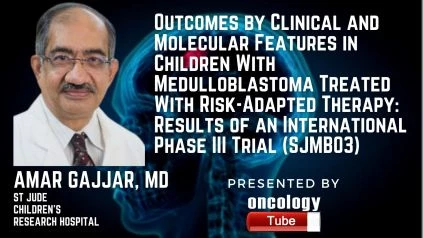Amar Gajjar, MD from the Division of Neuro Oncology, Department of Oncology, St Jude Children’s Research Hospital discusses Outcomes by Clinical and Molecular Features in Children With Medulloblastoma Treated With Risk-Adapted Therapy: Results of an International Phase III Trial (SJMB03).
Link to Abstract:
https://ascopubs.org/doi/10.1200/JCO.20.01372
SUMMARY –
SJMB03 (identifier: NCT00085202 on ClinicalTrials.gov) was a phase III risk-adapted study that aimed to evaluate the prevalence and clinical significance of biological variants and genetic abnormalities in medulloblastoma.
PATIENTS AND METHODS:Â
Based on DNA methylation profiles and gene mutations from next-generation sequencing, medulloblastomas were molecularly categorized into subgroups (Wingless [WNT], Sonic Hedgehog [SHH], group 3, and group 4) and subtypes. The study’s coprimary goals were to determine the relationship between ERBB2 protein expression in tumors and progression-free survival (PFS), as well as to estimate the frequency of mutations linked to WNT and SHH tumors. The most stable clinical and molecular risk factors were analyzed and used to model new risk-classification categories.
RESULTS:Â
RESULTS:Â Average-risk patients (n = 227) had a five-year PFS of 83.2 percent (95 percent CI, 78.4 to 88.2), while high-risk patients (n = 103) had a PFS of 58.7 percent (95 percent CI, 49.8 to 69.1). In the overall cohort (P =.74) and when patients were stratified by clinical risk (P =.71), there was no connection between ERBB2 status and PFS. WNT tumors had the most mutations in CTNNB1 (96 percent), DDX3X (37 percent), and SMARCA4 (24 percent), while SHH tumors had the most mutations in PTCH1 (38 percent), TP53 (21 percent), and DDX3X (19 percent). 53 WNT (17.4%), 48 SHH (15.7%), 65 group 3 (21.3%), and 139 group 4 (45.6%) tumors were identified using methylome profiling. Three low-risk groups (WNT, low-risk SHH, and low-risk combined groups 3 and 4) with excellent (5-year PFS > 90%) survival and two very high-risk groups (high-risk SHH and high-risk combined groups 3 and 4) with mediocre (5-year PFS 60%) survival were reported in a systematic clinicomolecular risk factor study.
CONCLUSION:Â
These findings create a new risk stratification for medulloblastoma trials in the future.

